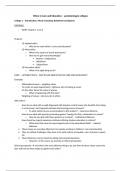Ethics in Care and Education – aantekeningen colleges
College 1 – Introduction. Moral reasoning; Relativism and Egoism
Literature:
- Wolff, chapters: 1,2,3,6
Program
- (1) Applied ethics
o Why do we need ethics in care and education?
- (2) Meta-ethics
o What is the nature of moral statements?
o How do we gain moral knowledge?
Realism / Objectivism
Relativism
Subjectivism
- (3) Normative ethics
o What is the right thing to do?
PART I – APPLIED ETHICS – WHY DO WE NEED ETHICS IN CARE AND EDUCATION?
Examples
- Philosophical issues – weighing values
- To create an equal opportunity / righteous why of taking an exam
- On the other hand: the value of privacy
o What is happening with the data?
- Weighing of values = what you do in ethics
Why ethics?
- How do you deal with a pupil diagnosed with impulse control issues who benefits from being
in a classroom, but frequently disrupts the learning process of peers?
o To what extent do you accommodate to this student? – classroom dilemma
- How do you deal with parents protesting against ‘Coming Out Day’ celebrations in school?
o How do you deal with those parents as a school? – institutional dilemma
- How should we regard expensive institutes offering shadow education in schools?
o What does that mean for equal opportunity in the educational field? – national
dilemma
These issues are everyday dilemma’s for people working in children’s care and education
They are ethical challenges: they have to do with notions of equality, care, inclusion, respect,
etc.
These dilemmas can be solved by asking instrumental questions
o However: in this course we provide an ethical perspective
Ethical perspective not what is the most effective thing to do, but how do these values come into
play and how do they weigh up against each other?
,Codes of conduct
- Nederlandse Vereniging van Pedagogen en Onderwijskundigen (NVO)
- Association of American Educators
- Why do we need this course if there is a moral guideline in this profession?
From the Code of Conduct:
1. The professional educator strives to create a learning environment that nurtures to fulfilment the
potential of all students.
2. The professional educator deals considerately and justly with each student, and seeks to resolve
problems, including discipline, according to law and school policy.
3. The professional educator complies with written local school policies and applicable laws and
regulations that are not in conflict with this code of ethics.
Code of conduct for teachers in the US
- This is not enough to act in a moral way
- 3 points
o Seems straightforward
Case study 1: the cheating student
- Important scholarship for one of your students
- Precondition: average 7
- Problem: cheating on one test school policy, result should be 1
- Let’s say this student is from a low-income environment
- Scholarship opportunity is gone
- Two options
o School policy plagiarism, result for this student is 1
o Give the student an extra change without notifying anybody
- What does the code of conduct say about this?
o 1. To fulfil the potential of all students (extra chance)
o 2. Comply with school policies (stick to the rules)
o 3. Considerately and justly dealing with each student what does this mean in this
case?
- Code of conduct: a good starting point, but it has not got all the answers. Moral issues have
to do with your interpretation, reasoning, etc. Code of conduct is definitely not the end point
Moral judgements must be backed by good reasons. Clear and concise reasoning.
A moral sound argument, without logical fallacies
Beware of reasoning that misuses analogies, turns to ‘slippery slopes’ etc.
Important strategy in moral thinking: thought experiments (support of a theory, provide
counterexamples, develop moral argument)
,Applied ethics
- Begins with a specific problem; then looks at values, principles or other normative standards
involved
- Professional ethics: a community of professionals is always a moral community as well.
Professionals share values, implicit or explicitly listed in codes of conducts or protocols. Using
these will inform their decision-making process
o Not fixed values, specifically about technology in care and education
Set-up course
- Week 1-4
o Introduction into moral theories, reflecting on moral issues for ortho & education:
Equality & diversity
Rights & Care
- Week 5-7 (separate meetings masters)
o Ortho: applying Code of Conduct
o Ethics: moral decision-making model for education
PART II – META ETHICS
= doing ethics while you are sort of above the field of ethics
From the code of conduct
1. The professional educator strives to create a learning environment that nurtures to fulfilment the
potential of all students.
2. The professional educator deals considerately and justly with each student, and seeks to resolve
problems, including discipline, according to law and school policy.
3. The professional educator complies with written local school policies and applicable laws and
regulations that are not in conflict with this code of ethics.
Moral statements, because they don’t describe a specific factor
What makes a claim ‘moral’?
- Moral claims need first to be distinguished from factual ones: they describe and can be true
or false
o Factual claims: you can check this, they describe and can be true or false
o Ethical statements: you cannot say if they are true or false
- Moral claims: these claims are prescriptive, not descriptive: what you ought to do
- But how do we get to know moral statements? How do we find out what statements are
good?
Two questions
- “How do we gain moral knowledge?”
- “What is the nature of moral statements?”
- These questions are ‘meta-ethical’ questions: what is the nature of ‘norms and values’?
Where do moral rules come from? Etc.
- About the understanding of morality
,





